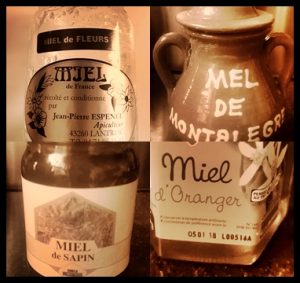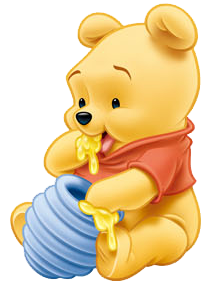
Once upon a time there was a little French girl who loved honey. Her mother did try to introduce her to jam and marmalade, but it never took with the little girl. Maybe occasionally she would enjoy a home-made one, or one imported from England, but she would always return to honey.
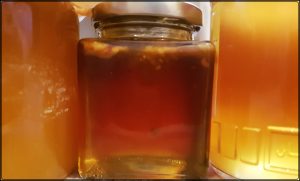 As time went by, the little girl turned teenager, and her appreciation of the thick golden nectar grew into a curiosity. She begun a collection of her favorite tastes in honey, hunting for pots from different variety, origins, flowers and trees. She created a list and gave them stars. She urged her family and friends to bring some back from their travels if they could.
As time went by, the little girl turned teenager, and her appreciation of the thick golden nectar grew into a curiosity. She begun a collection of her favorite tastes in honey, hunting for pots from different variety, origins, flowers and trees. She created a list and gave them stars. She urged her family and friends to bring some back from their travels if they could.  Within a few years, her list showed more than 70 different types of honey from all over the world. Her least favorite was Eucalyptus Honey from Mexico, reminding her too much of medicine. Some of her favorites were Lemon Tree honey from Spain, for its subtle taste and edgy twist, and Cedar honey from Lebanon, from its rich strong taste and woody note. Unsurprisingly, she also had a weakness for Lavender or Thyme honey; after all, these are the wild flowers of her beloved Mediterranean homeland.
Within a few years, her list showed more than 70 different types of honey from all over the world. Her least favorite was Eucalyptus Honey from Mexico, reminding her too much of medicine. Some of her favorites were Lemon Tree honey from Spain, for its subtle taste and edgy twist, and Cedar honey from Lebanon, from its rich strong taste and woody note. Unsurprisingly, she also had a weakness for Lavender or Thyme honey; after all, these are the wild flowers of her beloved Mediterranean homeland.
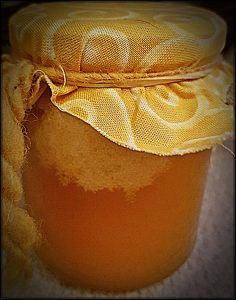 When she went to University, she left her list at home, and focused on her studies. Oh! She still indulged daily in her favorite treat, of course! Just the need to catalog her honey discovery had given place to her thirst for learning which now occupied all her mind. Yet even after she passed her degrees and started working, even after many had gone by, she would still find it very difficult, if not impossible, to resist buying a honey she had never tried before.
When she went to University, she left her list at home, and focused on her studies. Oh! She still indulged daily in her favorite treat, of course! Just the need to catalog her honey discovery had given place to her thirst for learning which now occupied all her mind. Yet even after she passed her degrees and started working, even after many had gone by, she would still find it very difficult, if not impossible, to resist buying a honey she had never tried before.
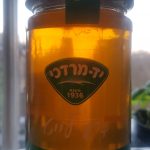 Today, the little girl Honey Lover is still omnipresent in the woman she has become. If you were to open her cupboard, you would find a selection of 4 to 5 (well… maybe 6 or 7) different sort of honey of various provenances. Her friends are wonderful in bringing her sample from their random trips, one a organic Swedish honey, another some Wild Forest Greek honey. From her latest travels, she filled her shelves with Iceland, Egyptian, and Maltese honeys.
Today, the little girl Honey Lover is still omnipresent in the woman she has become. If you were to open her cupboard, you would find a selection of 4 to 5 (well… maybe 6 or 7) different sort of honey of various provenances. Her friends are wonderful in bringing her sample from their random trips, one a organic Swedish honey, another some Wild Forest Greek honey. From her latest travels, she filled her shelves with Iceland, Egyptian, and Maltese honeys.
The benefits of honey are not limited to its sweetness and taste, to the contrary.Honey has many “mysterious therapeutic properties”, only a few of them listed below:
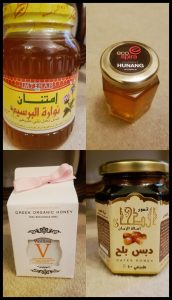 Helps reduce the risk of some cancers and heart disease because honey contains flavonoids and antioxidants;
Helps reduce the risk of some cancers and heart disease because honey contains flavonoids and antioxidants;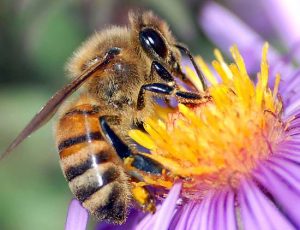 Sadly, it is impossible to broach the subject of honey without mentioning the alarming decline of honeybees around the world since the 1990s. And it is not alarming just for the honey lover, it is for the planet and any being on it. Bees play an essential role in ecosystems thanks to their pollination. For example, a world without pollinators would be devastating for food production, as a third of our food depends from it.
Sadly, it is impossible to broach the subject of honey without mentioning the alarming decline of honeybees around the world since the 1990s. And it is not alarming just for the honey lover, it is for the planet and any being on it. Bees play an essential role in ecosystems thanks to their pollination. For example, a world without pollinators would be devastating for food production, as a third of our food depends from it.
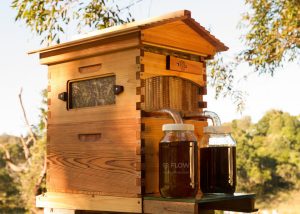 Returning to our grown-up little girl, the decline of bees combine with her love of honey to give her a new dream, one among many others, but a lovely one. It is to have her own beehive one day, here in London, tucked away in a corner of a garden or roof terrace. Not only would she have her own honey, she would participate in a very small way to keep bees alive. With the latest technology of ‘Honey on Tap’, this dream even appears attainable in the future. She lacks the training to handle bees and their hives, but that would not be a problem anymore thanks to this modern beehive, as you can see from the video below. The only issue in her having her own urban honey is, of course, having the space for it. One day, it will come … Patience!
Returning to our grown-up little girl, the decline of bees combine with her love of honey to give her a new dream, one among many others, but a lovely one. It is to have her own beehive one day, here in London, tucked away in a corner of a garden or roof terrace. Not only would she have her own honey, she would participate in a very small way to keep bees alive. With the latest technology of ‘Honey on Tap’, this dream even appears attainable in the future. She lacks the training to handle bees and their hives, but that would not be a problem anymore thanks to this modern beehive, as you can see from the video below. The only issue in her having her own urban honey is, of course, having the space for it. One day, it will come … Patience!
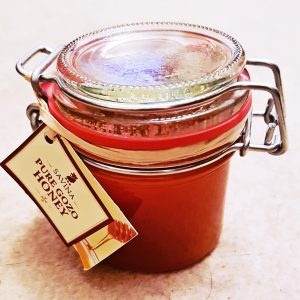 Now why do I share this story with you? Well, simply to share how the simplest thing in life can bring great pleasure; how there is always, and will always be, a little child in you ready to come out; how amazing nature is, that bees can produce such a nectar, which is has such numerous health benefits; and of course, because my love of honey has been with me for so long, I was bound to write about it at some point…
Now why do I share this story with you? Well, simply to share how the simplest thing in life can bring great pleasure; how there is always, and will always be, a little child in you ready to come out; how amazing nature is, that bees can produce such a nectar, which is has such numerous health benefits; and of course, because my love of honey has been with me for so long, I was bound to write about it at some point…
Thank you for reading,
Virginie
P.S.: yes, all the photos with pots of honey in this article are from my kitchen cupboard.
